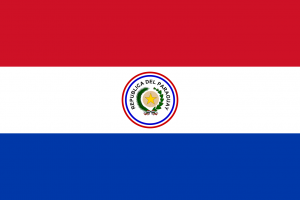Language/Paraguayan-guarani/Vocabulary/Counting-and-Numbers
< Language | Paraguayan-guarani | Vocabulary
Jump to navigation
Jump to search
Rate this lesson:
Learn How to Count in Guaraní
Hi Guaraní Learners! 😃
In today's lesson we will learn HOW TO COUNT in Guaraní.
Happy learning!
Take a moment to explore these relevant pages as you conclude this lesson: Family, Colors, Parts of the Body & Seasons.
Cardinal Numbers[edit | edit source]
List[edit | edit source]
- 1 – peteĩ
- 2 – mokõi
- 3 – mbohapy
- 4 – irundy
- 5 – po
- 6 – poteĩ
- 7 – pokõi
- 8 – poapy
- 9 – porundy
- 10 – pa
- 11 – pateĩ
- 12 – pakõi
- 13 – paapy
- 14 – parundy
- 15 – papo
- 16 – papoteĩ
- 17 – papokõi
- 18 – papoapy
- 19 – paporundy
- 20 – mokõipa
- 30 – mbohapypa
- 40 – irundypa
- 50 – popa
- 60 – poteĩpa
- 70 – pokõipa
- 80 – poapypa
- 90 – porundypa
- 100 – sa
- 1,000 – su
- one million – sua
Rules[edit | edit source]
Now that you have an overview of the most useful numbers, let's move on to the rules for writing tens, composite numbers, and why not hundreds, thousands and beyond (if possible).
- Numbers from 0 to 9 are rendered by specific words: mba’eve [0], peteĩ [1], mokõi [2], mbohapy [3], irundy [4], po (which also means hand) [5], poteĩ [6], pokõi [7], poapy [8], and porundy [9].
- Tens are formed by suffixing the multiplier digit with the word for ten ( pa ) with no spaces, except ten itself: pa [10], mokõipa [20], mbohapypa [30], irundypa [40], popa [50], poteĩpa [60], pokõipa [70], poapypa [80], and porundypa [90].
- Composite numbers are formed starting with ten, then the unit without a space for teens, and separated by a space from twenty-one to ninety-nine (e.g.: papoteĩ [16], mokõipa pokõi [27]).
- Hundreds are formed by suffixing the multiplier digit with the word for hunderd ( sa ) without a space, except one hundred: sa [100], mokõisa [200], mbohapysa [300], irundysa [400], posa [500], poteĩsa [600], pokõisa [700], poapysa [800], and porundysa [900].
- Thousands are formed by suffixing the multiplier digit with the word per thousand ( su ) without spaces, except per thousand: su [1,000], mokõisu [2,000], mbohapysu [3,000], irundysu [4,000], posu [5,000], poteĩsu [6,000], pokõisu [7,000], poapysu [8,000], and porundysu [9,000].
- The word for million is sua. Millions are formed regularly like hundreds and thousands, suffixing the multiplier digit with the word for million: sua [1,000,000], mokõisua [2,000,000], mbohapysua [3,000,000]…
Sources[edit | edit source]
Other Lessons[edit | edit source]
- Education
- Animals
- Hobbies
- Fruits
- Body
- Family
- How to Say Hello and Greetings
- Sports
- Days of the Week
- Seasons
- Geography
- Drinks
- Location
- Vegetables
- Directions

